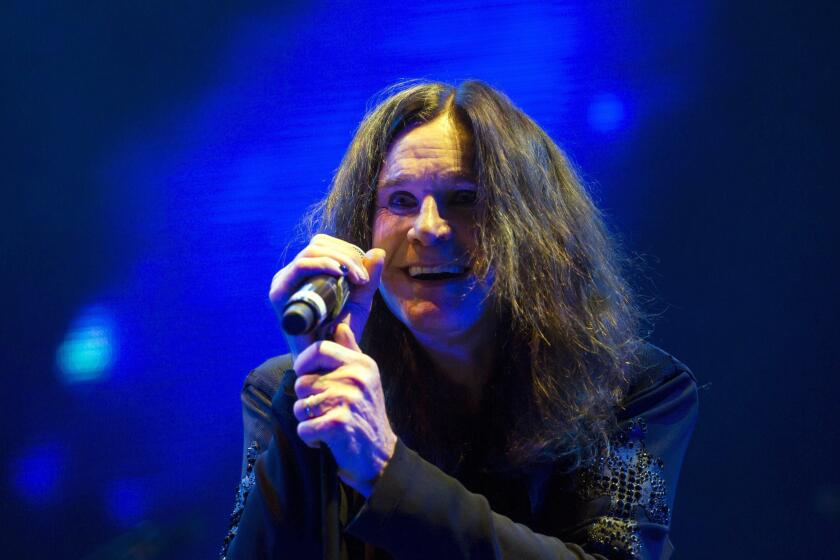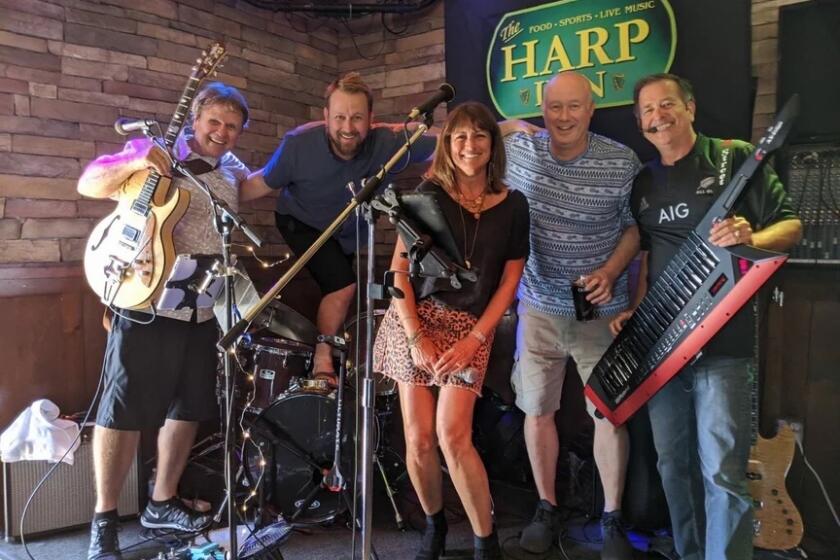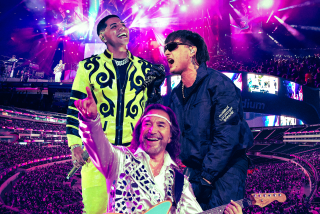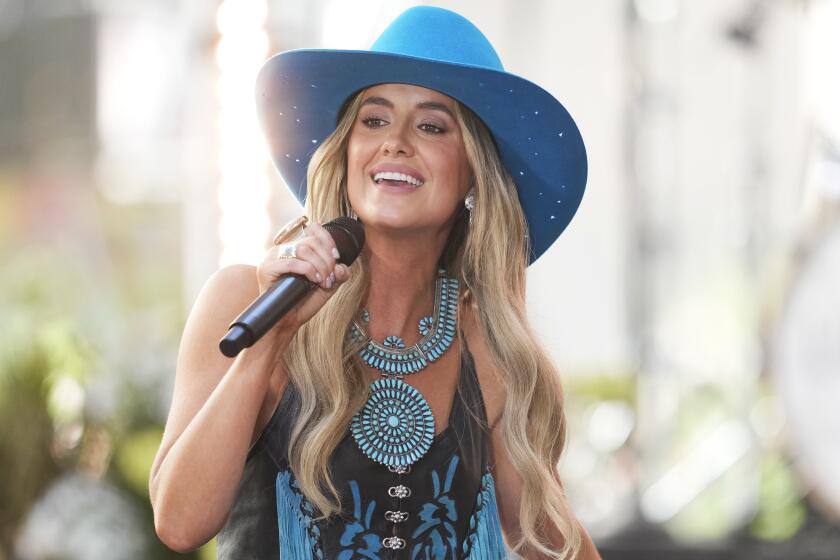Metallica, a stadium warhorse, freshens its onslaught at SoFi
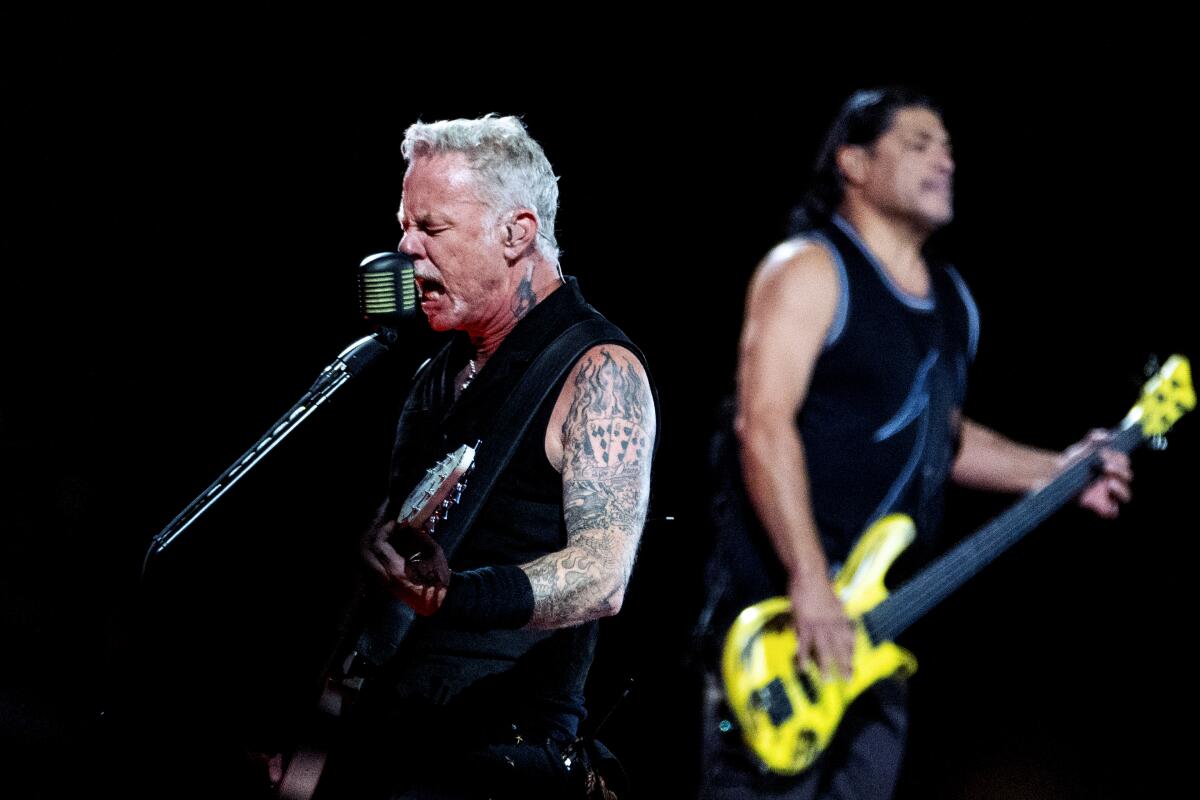
As the lush and foreboding sound of Ennio Morricone’s “The Ecstasy of Gold” filled the air inside SoFi Stadium on Sunday night, the four members of Metallica strode onstage with the practiced swagger of gladiators, took their positions around Lars Ulrich’s drum kit and promptly tore into “Whiplash,” a frenzied invitation to bang one’s head from Metallica’s 1983 debut, “Kill ’Em All.”
Well, one of Ulrich’s drum kits, that is: Half an hour or so after the band began Sunday’s concert, the drummer’s set disappeared through a trap door and a second set emerged a couple of hundred feet away on the stage, which was shaped like a ring on the stadium’s floor; ditto half an hour after that, then again half an hour after that. By the end of the two-hour show, Ulrich had played four different kits facing four different directions, his bandmates looping around him as they made use of microphones placed at intervals around the ring.
This — along with a set list the group says changes every night — is how Metallica keeps itself amused on the road more than four decades into its career as the biggest heavy metal band of all time.
“Thanks for putting up with our antics,” frontman James Hetfield told the crowd at one point. “We’re still having fun after 42 years.”
Ozzy Osbourne will be replaced by Judas Priest at October’s Power Trip festival after the rocker exited for health reasons.
Metallica is ostensibly touring behind its 11th studio album, “72 Seasons,” which came out in April to typically robust sales-and-streaming numbers and respectful reviews. But Hetfield seemed almost sheepish about playing new material at SoFi. “Like that song?” he asked after “If Darkness Had a Son.” Then he spoke in what he imagined as the voice of the audience: “Not your best — keep trying.”
No matter: As with any band with a history as long as Metallica’s, the real reason to play live is to showcase the old hits, which in this case meant the bludgeoning yet still-crisp likes of “For Whom the Bell Tolls,” “Wherever I May Roam,” “One” and “Enter Sandman.” Within two minutes of the start of “Whiplash” on Sunday, at least five mosh pits had broken out on the floor, including one among the fans who took in the show from the center of the ring.
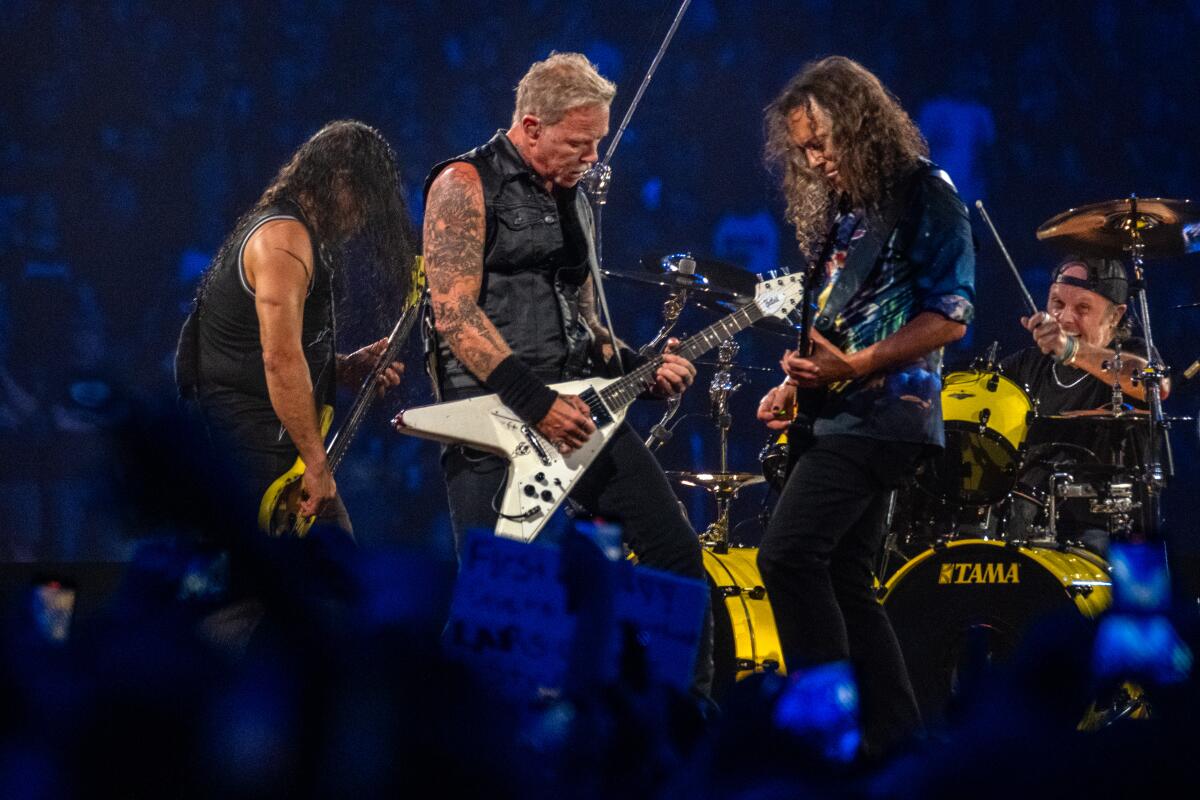
What separates Metallica from many other A-list hard-rock acts — several of which, including Guns N’ Roses and Tool, will share the bill with Metallica at October’s Power Trip festival in Indio — is its insistence on mixing up how it presents those hits. This was the second of two SoFi dates on a tour that has the band playing two shows in every city it visits; the gambit is that it’s not repeating any songs from Night 1 to Night 2.
Which meant that, unlike Friday’s crowd, Sunday’s missed out on hearing “Orion” and “Nothing Else Matters,” not to mention “Master of Puppets,” the 1986 classic that got a huge boost last year after it was prominently featured in the season finale of Netflix’s “Stranger Things.” (Each SoFi concert drew approximately 78,000 fans, the most for any single gig at the Inglewood stadium that opened in 2020.)
Yet the appeal of the band’s approach is that it seems unusually engaged in a minute-to-minute sense in the work of bringing these well-worn riffs and grooves alive.
M Street, a classic-rock cover band, were a few songs into their set at Cook’s Corner when a gunman opened fire. ‘We were fish in a barrel,’ they told The Times.
“Welcome Home (Sanitarium)” was ferocious but oddly sensual too; “Fight Fire with Fire” attained a kind of weightlessness atop Ulrich’s pulverizing double-time beat. Everyone in the building had likely heard “One,” Metallica’s vivid account of a horrifically injured soldier that became the band’s breakthrough at MTV in 1989, dozens of times; still, the switch from the song’s pretty opening section to its artillery blast of a climax somehow registered as a shock.
Roughly halfway through the show, guitarist Kirk Hammett and bassist Robert Trujillo performed an instrumental piece they said they’d composed from scratch earlier Sunday — a recurring bit on this tour that further emphasized Metallica’s deep commitment to musicianly values.
The band didn’t withhold the visual spectacle demanded by a stadium setting recently vacated by Taylor Swift and soon to be occupied by Beyoncé. There were giant towers with video screens floating 50 or 60 feet in the air; there were pyrotechnics; there were black-and-yellow beach balls that went bouncing across people’s heads during a festive and snarling “Whiskey in the Jar.” During “Ride the Lightning,” a spotlight caught Hammett at precisely the right moment to illuminate his silhouette in smoke pouring from a machine — a gorgeous image no one could have guaranteed would materialize.
There were also comforting reminders, in contrast with all the adventure, of Metallica’s endurance despite rock’s having long since ceded its place at music’s center to pop and hip-hop: Ulrich’s backward ball cap, his standing up every now and then to hit his cymbals, Hetfield’s barking at the audience (in a friendly way) about what it means to be a member of this band’s devoted core.
Dressed in a form-fitting vest and matching sweatbands around his wrists, he introduced “Moth Into Flame” as a song about addiction, then joked that “nobody here would know anything about that.” The Metallica family, he added, welcomes everybody. “But it helps if you’re a f—up or a misfit.”
More to Read
The biggest entertainment stories
Get our big stories about Hollywood, film, television, music, arts, culture and more right in your inbox as soon as they publish.
You may occasionally receive promotional content from the Los Angeles Times.
